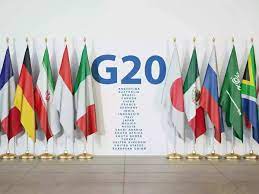India Supports the Global South at the G20 Summit
India is serving as the G-20 president for the first time at this time. The way the G-20 presidency is observed and carried out across the nation makes it resemble an Indian festival. This improves how the G-20 is seen in India and abroad.
In contrast to previous presidencies’ sedate handling of their duties, India’s joyous attitude to the G-20 is new. India took steps to improve inclusivity, responsiveness, and celebration inside and outside of the G-20. What will the G-20 summit’s primary beneficial effects be for India?
India’s expanding status, especially in the Global South, is unquestionably strengthened. India has successfully collaborated on development projects with a number of other nations, including those in Africa, ASEAN, the Pacific Islands, the Caribbean, and Central Asia. These surely won’t stop. The Global South has now been included into the G-20 presidency’s priority-setting process. Through the January 2023 Voice of the Global South virtual conference, India contacted 125 nations that are often excluded from the process. Aside from that, the roster of India’s G20 guests is heavily dominated by nations from the Global South. India’s president has so accomplished much by conveying the goals of the Global South and serving as their primary spokesperson.
Africa has often been discussed at G-20 meetings, although it is seldom permitted to participate in G-20 decision-making. Although other presidents have supported African projects, none have been as outspoken as India. It is unique for India to take the initiative to seek the G-20 participants to approve inviting the African Union as a permanent member. No administration has ever attempted to change the membership, mostly out of concern about starting a flood. In order to ensure that a large portion of the Global South and Africa are represented at the table to debate the G 20 agenda, India positioned itself as an advocate for Africa. The AU would no longer be only a visitor at the high table of the international order but would instead acquire a permanent seat there. Although South Africa is the sole African nation in the G-20, it does not speak for the continent as a whole.
India put in a lot of effort to protect the G-20 from the whims of great power competition, particularly by shielding it from the Ukraine issue. Even though it’s still uncertain if a G-20 statement will be released, India is prepared for a Chairs Summary that is acceptable to everyone, with the exception of the substantive passages about Ukraine. This is significant because each item on the agenda has to be rigorously pursued while keeping those objectives in mind if the G-20 agenda is to be focused on the expression of concerns from the Global South. It is evident from the discussions in the ministerial and various working groups that India has successfully positioned the agenda for development, climate change, health, SDGs, and new economic dimensions. This goal continues in some respects, but it also gave many ideas concentration that the Ukraine crisis threatened to distract from.
Speaking with a large number of businesspeople, it becomes clear that the G-20’s distribution throughout roughly 60 Indian cities resulted in a surge of new economic activity in those areas. Airports have been revitalized, infrastructure has been updated, and tourism and hospitality have flourished. Even while it may be argued that this is just for G-20 gatherings, its effects will continue longer. The areas of the economy that the surge of G-20 delegates has most directly affected predict that the momentum they have created will last for at least another two seasons. Even if that may need to be updated, India’s role as the G-20’s head, which solidified the importance of the Global South, is perhaps one of the country’s greatest diplomatic triumphs in the present stage of shifting international realities.
The current state of the world necessitates a multipolar order, both strategically and in terms of the increased number of growth centers and diverse supply chains. It is essential to improve globalization’s protection and distribute its advantages more fairly. Natural resources in the Global South should have a remunerative value since this would enable improved SDG achievement.
It is crucial in this regard to reform the multilateral development banks, make local currency-funded instruments more accessible, and create varied and alternative supply chains that are not reliant on untrustworthy partners. The Indian G-20 leadership has shown the necessity for equally resilient action to match such resilience in ideas. It is necessary to react to the needs of the Global South more coherently rather than just seeing them as the victims of great power competition. Such resiliency and cohesion are goals of the Indian G20 Presidency.
It would have been appropriate if India had been able to collaborate with the other rising nations that are now chairing the G20, like Brazil, South Africa, and Indonesia, and possibly establish a small fund to assist the SDGs in the Global South. Such a self-help fund would have shown to China and the G7 that although significant, their support was not the sole source of cash available to the Global South.
India is likely to cooperate with and act as a node in the developing multipolarity due to its growing status in terms of positioning and perception. This will have a positive effect on India since it is a powerful node of sustainable development with new investments in developing value chains and innovative economic theories.







